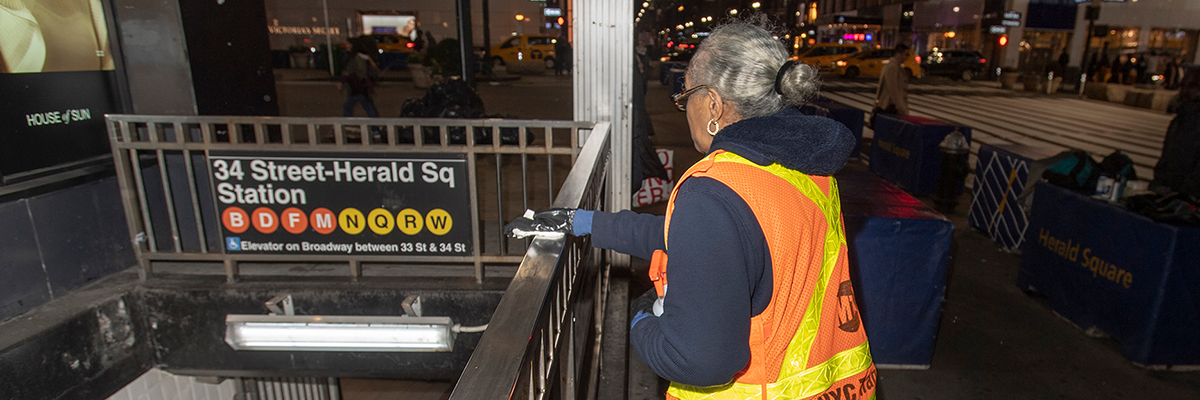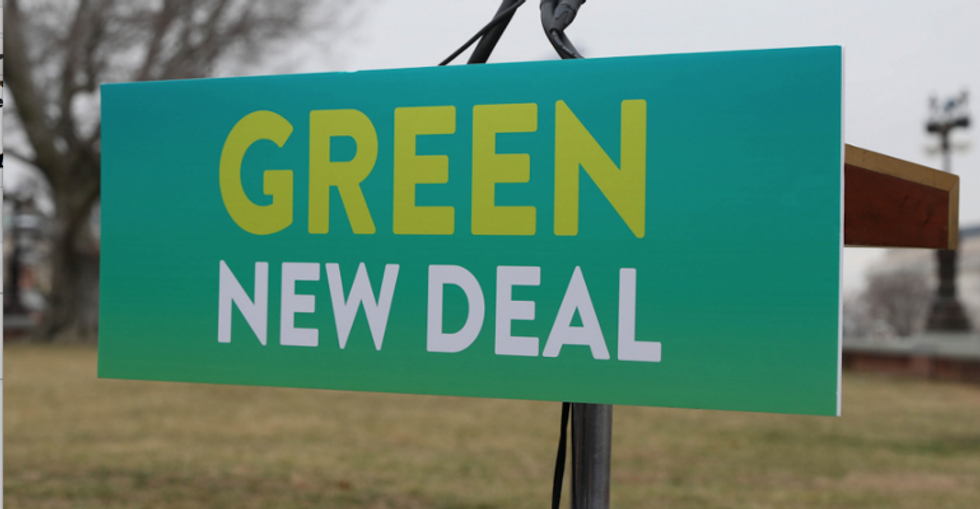The coronavirus pandemic threatens all of us. People are scared, and rightly so. But when we look to our government officials and employers, whose responsibility it is to provide protection in an emergency, what do we find? In the words of the National Nurses United--a union whose members are risking their lives every day on the frontlines of the coronavirus pandemic --"Federal, state, local, and employer efforts to fight the coronavirus" are "outrageous" and "ineffective."
At least until those in authority get their act together, we need to start protecting ourselves and each other--not only as individuals, but collectively. Call it a "do-it-yourself Green New Deal."
The core idea of the Green New Deal is to put people to work meeting our needs. So far the GND has been aimed primarily at challenging climate destruction and inequality. But our most urgent need right now is to protect against COVID-19 and the devastating impacts it will have on our communities and our jobs. The government isn't doing it. Our employers aren't doing it. So, if it is going to be done the people have to do it ourselves. We can take the core idea of the GND and start applying it right now. That means an "Emergency People's Green New Deal."
Let's start by looking at the emergency needs that have to be met. Then we can look at the human resources we have to meet them. Finally, we'll look at the social and political process we need to make it happen.
The needs

Here are some of the emergency needs that must be met right now:
Encourage emergency health protection practices. Immediate measures to slow the pandemic include staying at home as much as possible, social distancing, banning of dangerous gatherings, and preventative care for the most vulnerable. Action by teachers to close the schools and by other workers for similar protective policies are essential "first aid."
Expand community health centers. Everyone should have access to a nearby healthcare facility where they can get reliable information, emergency services, and referral and transportation to appropriate care.
Ensure food access. The elderly, people with disabilities, families with children, and everyone who can't easily meet their own food needs must have access to nutritious food. That requires both food preparation and delivery. It means a large and rapid expansion of Meals on Wheels, school lunch programs, and SNAP.
Find and help isolated and immobile people. Going door to door. Constant communication, daily calls. Homemaker and home healthcare services. Meeting all kinds of needs from rides to medical appointments to shopping -- as they come up.
Establish emergency shelters. People who have been infected who cannot look after themselves at home, people who have been discharged from the hospital but are not yet able to care for themselves, the homeless, survivors of domestic violence, and college students quarantined off campus need shelter, food, and healthcare.
Provide support and relief for healthcare workers. Healthcare workers should have as much assistance as they can use, including both retired and in-training medical personnel and people without medical training who can help with unskilled tasks. They should be provided with rest breaks and brief vacations. When they cannot leave work, they should be provided with helpers who can assist with household tasks, childcare, shopping, and other needs.
Effectively advocate for health policy that is not "outrageous" and "ineffective." Rapid mobilization of mass pressure to force governments, the medical industry, and employers to adopt standards, provide equipment, and follow policies recommended by healthcare workers.
Such programs will inevitably have to start piecemeal--but we don't have to wait to start the pieces we can begin immediately. Doing so will reduce human misery--and save lives.
The workers
Some of these roles are currently being performed by volunteers. Meals on Wheels of Southwest Ohio and Northern Kentucky, which serves about 2,000 clients, is seeking 50 volunteers to assemble food boxes "that we could get out immediately to people who may need meals" because "there is the potential for senior meal sites to close and we want to make sure we're prepared to get people food right away." In Sanford, Florida, the Seminole County school district trained volunteers to teach students the techniques of effective hand washing. In Cape Cod, a Medical Reserve Corps is recruiting "clinical and non-clinical volunteers" for "supporting emergency response after a natural disaster, assisting at a seasonal flu clinic, or helping promote community preparedness." "Specific roles" are based on "the volunteer's background, interests and skills," as well as the needs of the Medical Reserve Corp and the community. In Kingston, NY the Ulster County department of health is recruiting and training volunteers to help field phone calls related to the coronavirus from 9 am to 7 pm seven days a week.
But volunteer services have already been proving inadequate. For example, the Ballard Food Bank in western Washington said, "A lot of our volunteers are seniors and they are staying home to avoid exposure to any possible illness." Volunteers have a role to play, but they will not be able to provide the enormous amount of work that will be required to meet the needs described above.
However, there will be large numbers--we don't know yet how many--who will be out of work directly because of lockdowns from the virus, immediate resulting disruptions, and the economic recession that is now inevitable and that many believe has already started. Industries hit are likely to include hospitality and leisure, transportation, food services, manufacturing, education, and others. Those losing their jobs are likely to be in the millions. Many if not most of them are likely to be in the 40 percent of employees who are "low-wage" workers and who cannot even meet an unexpected $400 expense--let alone loss of their jobs.
The obvious solution is to put the needs that have to be met together with the people who are available to meet them. Hire the workers laid off as a result of the coronavirus and resulting economic dislocation to help staff the health centers, bring food and care to shut-ins, and meet the other needs outlined above.
Providing for those who need work and income is a crucial part of preventing the spread of the virus. Nobody should go to work when it is risky for them and the community to do so just because they can't pay their bills. Emergency coronavirus jobs have a role to play along with expanded unemployment insurance, free healthcare, wage replacement, and other emergency income maintenance programs.
Not everyone will have all the right skills. But in many cases workers' existing skills can make a contribution. Fast food and other food service workers are likely to be among those hardest hit by layoffs--and their skills in food preparation and delivery will be a big boost for Meals on Wheels, school breakfast and lunch, and other food programs. Medical residents, trainees, and retired medical professionals can rapidly train and supervise workers from other industries in some of the needed healthcare practices. People with modest construction experience can help with emergency housing repair and retrofitting buildings for community health centers and shelters. Anyone who works a telephone and has basic communication skills can help find and keep in touch with isolated and vulnerable people. Anyone who has helped a kid with their homework can do one-on-one tutoring--on-line, if necessary -- with students who have had to stop going to classes. And anyone can participate in demonstrations, mass picketing, lobbying, phone banking, and other mobilizations to affect government and corporate policy.
Making it so

Last year when the U.S. government was shut down for 35 days by President Trump, the airline flight attendants union projected itself into the center of the national political arena by calling for mass action, occupations of politicians offices, and a general strike. Flight controllers, TSA workers, and others in the aviation industry began calling in sick. Largely in response to these actions, the government shutdown was ended, and Trump backed off from his threat to shut it down again. Healthcare workers, teachers, janitors, airport workers, other workers, their unions, and their allies are in a position to make a similar impact on coronavirus policy.
Workers and community groups have already begun to advocate for policies that--unlike official government programs so far--provide serious protection for our people.
In Chicago, a coalition of fifteen unions led by the Chicago Teachers Union proposed a program designed to offer:
- 15 paid sick days a year, instead of the five mandated for Chicago employers, with the protection extended statewide.
- A citywide meals-on-wheels program, internet access and electronic devices for students forced to stay home because of school closings.
- Debt forgiveness, suspended mortgage payments, a temporary shutdown of eviction court and a moratorium on utility shut-offs.
- No more penalizing schools by basing funding on school attendance.
- Adequate cleaning supplies -- and a nurse in every school.
Healthcare union spokespeople explained the reasons for these demands. Elizabeth Lalasz, a nurse at Stroger Hospital, spoke for National Nurses United. "The entire family needs to be isolated to protect the community. If these children or their families become ill, they will be asked to return to Vaughn to get the tests, but many don't have cars. Do we have them take public transportation? Of course not. Public health workers should come to their homes to test them," she said. But "if they can't make rent or feed themselves, how do we expect them to stay home?" Greg Kelley, president of SEIU Healthcare Illinois, said, "Unless employers commit to providing up to 15 days fully-paid leave, workers will be forced to make the hard choice of whether to go to work sick, like many of them have already been doing, or to lose pay. And, at their rate of pay, they cannot afford to do that."
Chicago Teachers Union chief of staff Jennifer Johnson said the teachers union is demanding that the Chicago Public Schools "build an infrastructure" to support what she called "remote learning." "This would require taking dramatic steps like providing internet access and devices to students who need to stay home," She called for emergency changes to a "school quality rating policy" at CPS that "incentivizes" schools to "keep attendance as high as possible."
In Seattle, janitors and airport workers laid out proposals for a mobilization against the coronavirus, including a worker role in making workplaces safe. Said SEIU6 President Zenia Javalera,
To keep Seattle and Washington state as safe as possible, I urge area employers to mobilize against the virus and immediately grant any worker with symptoms paid sick leave to fully recover from illness before returning to work. Do whatever they can to increase worker access to our healthcare system. Distribute workplace-specific materials and equipment to keep workers safe and healthy. Hold labor-management meetings to listen to front-line workers and make workplace-specific plans to contain the virus; and develop workplace trainings to maximize worker and public safety.
In New York City on Friday, March 14, Twitter postings began calling for a teacher sickout to demand that the city close its public schools. "Nervous teachers" began consulting colleagues about taking the "drastic action" to protect themselves and their families. On Saturday some teachers began calling for a "mass sickout" on Wednesday. "We've talked about it," one told The New York Post, adding that his union chapter is holding a meeting on Monday to vote yes or not to join the sickout.
On Saturday the Movement of Rank & File Educators (MORE) called for Mayor De Blasio to close the public schools. Noting his failure to do so, they said "teachers will need to take action to protect the health of our students and their families by calling in sick on Monday." They added, "We are happy to work distributing food to our students or providing them with online instruction." They demanded that the closure of schools be accompanied by efforts to distribute food to families who need it and as medical centers or care centers for children of healthcare workers.
MORE also issued these demands:
- All temporary public shelters should be kept open during the day.
- Food should be made available to those who depend on public school meals, as is done in the summer.
- Freeze rent and extend the moratorium on evictions (sign a petition here for that demand).
- Pressure Spectrum, Verizon, Optimum, and other providers to open up free internet for public school students to ensure continuity of instruction. Pressure Google to provide free Chromebooks for students who need them.
- Encourage employers to allow all parents/guardians to stay home to care for their children. Provide real estate tax relief to enable small businesses to provide sick days.
- Establish an emergency fund to help affected businesses and their workers, regardless of immigration status.
- Clinics testing, and testing itself should be free of charge for anyone, with or without medical insurance, and should require no paperwork indicating immigration status so that all community members can seek treatment without fear.
- Streamline emergency unemployment for workers who get laid off due to staying home
- Ensure patients and those likely to get COVID-19 have the medical checkups and treatment quickly. Those under quarantine should be taken care of medically and financially.
Teachers' union president Michael Mulgrew joined the New York City Council Speaker and City Comptroller to call for the public schools to be shut but continue to distribute meals to needy youngsters and provide online academics.
At an earlier point, George Gresham, president of the healthcare workers union SIEU 1199, had urged the city to keep the schools open, warning that hospitals, bracing for a flood of virus patients, could face a manpower crisis if schools closed suddenly and healthcare workers had to stay home with their children. Mayor de Blasio had cited Gresham's statement in defense of his decision to keep the schools open. Gresham then called on De Blasio to close the schools, saying,
he was now confident a plan could be reached to provide childcare for healthcare workers through school resource centers. He also called on the city and state to provide more funding for childcare for healthcare workers.
On Monday mayor Bill de Blasio announced the decision to close New York City's 1,900 public schools at least through April 20.
Our millions of healthcare workers have a special role to play in guiding an emergency Green New Deal to address the coronavirus emergency. Nobody knows what needs to be done better than they do. If government won't mobilize the people to fight for our lives and health, healthcare workers can take the lead. Let healthcare workers and their unions define a coronavirus protection strategy based on the best available science and the real needs of real people.
If government and employers fail to implement these policies, community groups and unions can directly impose them--as New York teachers helped force the closing of the city's schools. Healthcare workers and janitors can simply start to follow the necessary safety procedures. Community supporters can demand that they have the right equipment to do so and that they not be penalized for protecting themselves and the community.
How can such programs be paid for? The U.S. Federal Reserve is right now spending trillions of dollars to bail out Wall Street. The Trump administration has already started subsidizing the capsizing oil and gas industry. Further bailouts and economic stimulus initiatives are undoubtedly on the way. That money will be far more effective as an economic stimulus if it is used to provide healthcare, essential services, and jobs for those directly and indirectly hurt by the coronavirus pandemic. Local and state governments should immediately begin funding emergency Green New Deal efforts--and using their political clout to insist that federal economic rescue packages pay fund them.
As the Great Depression devastated daily life throughout the country, community organizations, worker self-help groups, and state and local governments began improvising emergency responses that would put workers back to work meeting community needs. These efforts were harbingers of the New Deal, which put millions of unemployed workers to work fixing schools, building parks, making murals in post offices, and even putting on plays for hard-hit communities. A "do-it-yourself" emergency program today could serve in a different political climate as the basis for the "green jobs for all" program that is a central part of the Green New Deal.
We can't predict the future, especially in the midst of a crisis. But we can respond to crisis in ways that start laying the groundwork for a more constructive future--a Green New Deal.
For a fully annotated version of this article, please visit the Labor for Sustainability website here.



